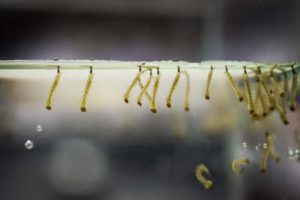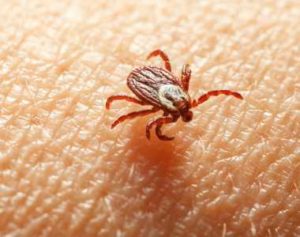DON’T FORGET ABOUT MOSQUITOES AND TICKS!
By Zachary Ciras on June 9, 2020.
While we are all caught up in the attempt to avoid one pervasive disease, COVID-19, we should remember that there are other diseases spread by pests that we will encounter as we move outdoors. Ticks and mosquitoes will still be around and, in fact, we may have more contact with these pests this summer as we spend more time in our own yards.
MOSQUITOES AREN’T JUST SUMMER PESTS
If you think it’s too early to worry about mosquitoes, you’re wrong. There are several different types of mosquitoes with different life cycles. Some spend the winter in hiding as adult mosquitoes. As soon as there’s a hint of spring, they emerge and must get a blood meal (that means biting) to lay eggs. Mosquito populations build throughout the spring and summer, and especially after rainy periods, but they can transmit diseases to people at any time (see It’s Not Too Early for Mosquitoes!).
THE REAL DEAL ABOUT MOSQUITOES
Most people don’t know how to avoid mosquitoes and their bites because they don’t understand mosquito biology (see Do You Know What “Baby” Mosquitoes Look Like?). You can do much to eliminate immature mosquitoes from your yard before they even turn into biting adults, if you know what to look for.
Adult female mosquitoes lay their eggs on the surface of standing water in puddles, buckets, wheelbarrows, kiddie pools, tree holes, etc., or in damp spots that typically flood when it rains. After the eggs hatch, aquatic wormlike mosquito larvae (sometimes called “wigglers”) grow for about a week, feeding on organic debris in the water. After pupating, also in the water, adult mosquitoes emerge and fly off.

Mosquito Larvae breathing from under water. Shutterstock.
If you look closely, you can see the mosquito larvae and pupae hanging upside down on the surface of the stagnant water where they breathe through short air tubes. If you get too close, they dive to the bottom.
HERE’S WHAT YOU CAN DO TO CONTROL MOSQUITOES
You can actually help protect your family from mosquito bites and diseases by breaking the mosquito life cycle. It’s easy to do, doesn’t cost anything, and could even be a fun diversion for the kids. Conduct a mosquito survey of your yard, looking for items that could hold rainwater and any signs of already developing mosquito larvae. For a checklist of places to look, see Patrol Your Yard for Mosquito Sites!
Controlling mosquito larvae couldn’t be easier. Simply dump out the standing water and immature mosquitoes, or re-grade or drain areas that tend to hold water. This is a perfect example of what we call integrated pest management (IPM) and reduces the need for pesticides later.
If you find containers that are not currently holding water, assume that they eventually will and store them inside or turn them upside down. Cover larger items that could collect water with tarps or plastic sheets but make sure that you don’t leave depressions in the cover that could hold water, too. Repeat your yard survey after every rain event.
For more tips about mosquito control, listen to this: Summer Pests: Mosquitoes
AND, THEN THERE’S TICKS…

American Dog tick on human skin. Shutterstock.
While you’re inspecting your yard for mosquito sites, consider things you can do to make your property less desirable to ticks and their mouse hosts, as well (see Take Steps to Keep Ticks Out of Your Yard). Colonial Pest Control is now offering tick management services on your property as part of our Preventative Maintenance Program. For more information on how we can help protect your family, see our service page, Tick Control and Prevention.